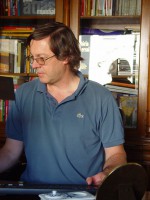abstract
This paper provides an in-depth analysis of the rehydration behaviour of recycled cement, obtained from thermal activation of waste cementitious materials. Phases' early age composition and development in pastes produced with recycled cement were followed from 8 h to 28 days and compared to those of Portland cement paste of similar composition. Characterisation was carried out using isothermal calorimetry, thermogravimetry, X-ray diffraction with Rietveld analysis, nuclear magnetic resonance spectroscopy, scanning electron microscopy and mechanical testing. The most significant hydration rate of recycled cement occurred after 24 h; corresponding calorimetric curves revealed a longer induction period than Portland cement pastes and a late acceleration peak after 30 h of hydration. Thermal analysis and microscopy observation showed that AFm phases in recycled cement paste developed at as early as 8 h. The alpha'H-C2S polymorph was identified through X-ray diffraction as the main phase present in anhydrous recycled cement. Rietveld analysis indicated a more significant reaction rate of this polymorph between 1 and 3 days, similarly to C3S in Portland cement paste at 28 days. The lower amount of the less reactive beta-C2S phase in recycled cement paste than in Portland cement paste appears to have led to slightly higher degree of hydration of the former at 28 days. However, the total volume of long-term hydrates was lower in recycled cement paste. A C/S ratio of 1.73 was estimated for alpha'H-C2S and nuclear magnetic resonance suggest that a similar type of C-S-H was formed in both pastes.
keywords
MECHANICAL-PROPERTIES; HIGH-TEMPERATURE; PASTE; DEHYDRATION
subject category
Construction & Building Technology; Materials Science
authors
Bogas, JA; Real, S; Carrico, A; Abrantes, JCC; Guedes, M
our authors
acknowledgements
Acknowledgments The authors wish to thank the Portuguese Foundation for Science and Technology (FCT) for funding this research under projects PTDC/ECI-COM-28308/2017, UID/CTM/04540/2019 (CERIS) and UIDB/04540/2020 (CeFEMA) . SECIL is acknowledged for supplying the ma-terials for the experimental campaign.


